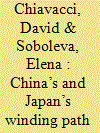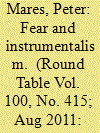| Srl | Item |
| 1 |
ID:
190964


|
|
|
|
|
| Summary/Abstract |
In the early 1980s, the People’s Republic of China (PRC) and Japan joined the international refugee regime. This timing similarity is puzzling due to the stark differences between the PRC as a communist and authoritarian state versus Japan as a prime example of capitalist development and democratization. Moreover, although both signed the 1951 Refugee Convention and the 1967 Refugee Protocol without major reservations, neither of them has fully implemented these treaties. Discussions regarding the PRC’s and Japan’s engagement with the international refugee regime tend to start with the beginning of the Indochina refugee crisis in 1975. However, this article shows that the early decades of their interaction with the international refugee regime are of crucial importance for a full understanding of the timing and form of accession to the international refugee regime. Although the Southeast Asian refugee crisis played an important role as a trigger, it was the changing character of the international refugee regime and the transformations of state identity in both countries that set the ground for the signing of the refugee-related conventions.
|
|
|
|
|
|
|
|
|
|
|
|
|
|
|
|
| 2 |
ID:
108146


|
|
|
|
|
| Publication |
2011.
|
| Summary/Abstract |
Immigration and border protection policies are driven by national interest. However, the national interest can be more broadly and more narrowly conceived, depending in part on the degree to which the future of the individual state is understood to be contingent on a shared global future and on the recognition that the short-term costs of international cooperation may bring long-term collective benefits. Whereas such global interdependence is recognised in international statecraft in the domains of aid, trade and climate change, such recognition does not extend to immigration. Australia's national policies towards human movement from the Global South tend to be driven in large part by exaggerated fears (of unregulated border crossings) or a narrowly instrumental approach to the economic benefits of human capital transfers (migrants filling skills gaps and providing flexibility in the labour market). A broader conception of migration would take into account the potential developmental benefits of human movement for source nations and for migrants themselves.
|
|
|
|
|
|
|
|
|
|
|
|
|
|
|
|
| 3 |
ID:
108147


|
|
|
|
|
| Publication |
2011.
|
| Summary/Abstract |
The history of Australian human rights policy in the developing world is chequered. Australia's most consistent contribution has been in socio-economic rights through its aid programme, and in its support for decolonisation. During the Cold War, a premium was placed on civil rights, in ideological opposition to communism. After the activism of the Evatt era from 1945 to 1949, and a hiatus until 1972, renewed engagement with multilateral institutions, in part as a way of influencing human rights in developing countries, came with the Whitlam, Fraser, Hawke/Keating and Rudd governments, while there was some retreat under the Howard government. All governments since the early 1970s have had considerable human rights successes (including through bilateral diplomacy) and some often dramatic failures; most have sacrificed human rights at some point for other strategic objectives. Governments have also struggled with their choice of means in confronting violations. There remains room for Australia to articulate a more effective human rights diplomacy.
|
|
|
|
|
|
|
|
|
|
|
|
|
|
|
|